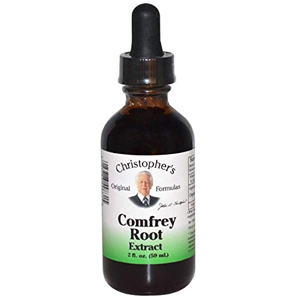Description
Dr. Christopher’s Comfrey Root Extract has been used traditionally for the cold, herpes, infections and much more.
Ingredients: Comfrey Root.
Ailments traditionally used for: Aphthous, Bones , Brittle, Broken, Bruising, Burns, Canker, Cold Sores, Common Cold, Duodenal, Fever Blisters, Hemorrhoids, Herpes Simplex 1, Immune Function, Infection, Injuries , Minor Injuries, Osteoporosis, Piles, Rheumatism, Sore Throat, Sprains, Strains, Sunburns, Tuberculosis, Ulcer , Upper Respiratory Infection, Wounds
Directions: Take 1 to 2 droppersful 3 times daily. May be mixed with juice or water if desired.The Latin name of comfrey–Symphytum officinaleis derived from the Greek word symphyein, which means conjoined and indicates the ability of comfrey extract to accelerate the healing of bone fractures. Pharmacological Properties: The biologically active substances of Dr. Christophers Comfrey Root Extract have protective properties lowering blood pressure and stimulating respiratory activity. Comfrey improves the skins tone and enhances the the intestine and uterine muscles. Furthermore, comfrey root extract contributes greatly to the regeneration of bone tissue by stimulating the cell growth and regenerating damaged tissues. It has a highly positive effect on pain relief in the gastro-intestinal tract, improves digestion, strengthens epithelialization during the mucous membranes inflammation. A similar property of the comfrey root extract was noticed in the upper respiratory tract diseases, where the extract improves the expectoration of phlegm, restores the epithelium function, and significantly reduces inflammation. Chemical Composition: Comfrey contains a considerable arsenal of biologically active substances, which belong to different groups and classes of organic elements. Its pharmacological aspects have diverse physiological and pharmacological activity. One of the most essential compounds of comfrey root extract is allantoin, also called a diureid glyoxylic acid. In addition to allantoin and alkaloids, the comfrey extract contains mono- and polyphenolic compounds. A group of German phytochemists found that these elements have anti-hormonal activity (Wagner et al., 1970). The lithospermic acid in comfrey roots contains other phenol carbonic acids such as hydroxycinnamic, chlorogenic, neochlorogenic, and caffeic acids. Comfrey root extract includes up to 29% of polysaccharides (S. Virk, 2003). Comfrey roots are also a rich source of such phytosterols as sitosterol, stigmasterol, triterpene alcohol isoborneol, and steroid saponins. The extract also contains from 1 to 3% of asparagine. In addition, comfrey roots contain traces of carotene (0.063%) and pyrocatechol tannins (4-6,5%), gallic acid, resin, traces of essential oil, starch, inulin, iridoid, choline, monoterpene glycosides, and coumarins. Historically Used For: Comfrey has a long history in medicine. Ancient sources mention that the legion warriors of ancient Rome used comfrey for healing purposes. Healing properties of comfrey were first described by Abu Ali ibn Sina (979-1037) in the Canon of Medicine. Dioscoride, an ancient Greek physician and philosopher, wrote that comfrey root may heal wounds. During the Renaissance, comfrey was one of the most popular medicinal herbs.The German alchemist and pharmacologist known as Paracelsus successfully used comfrey roots to treat wounds, ulcers and fractures. In the book “Herbarz Polski” (written in 1565), Polish scholar Marcin Uzhendova pointed out that comfrey root extracts mixed with honey may help stop internal bleeding. In the Middle Ages, comfrey was widely cultivated in monastery gardens and vegetable gardens as a valuable medicinal plant. Its roots were used internally and externally as a universal remedy for many diseases. Comfrey root extracts were used for bathing of children with rheumatic pain. Children from 1 to 5 years old were given fresh comfrey juice to improve the immune system. In several nations, comfrey roots were used to treat pulmonary tuberculosis. When added to milk, comfrey root extract healed stomach and duodenum ulcers. The comfrey decoctions were also used for stomatitis. Comfrey root was applied to burned and frost-bitten skin areas. Uses in Modern Herbal Medicine: Comfrey root extract is widely used in modern folk medicine as a powerful anti-inflammatory remedy for colds and tuberculosis. It is also used to treat inflammatory diseases of the respiratory tract. When applied externally, it heals broken bones, wounds, bruises, sprains, fractures, radiculitis, mastopathy, mastitis, tonsillitis, and ulcerative stomatitis. Several herbalists suggest the use of comfrey root for diarrhea. German folk medicine recommend comfrey root extract for diseases of the gastrointestinal tract such as dysentery, enterocolitis, chronic colitis, peptic ulcer, as well as chronic bronchitis, hemoptysis, epistaxis, and as an external remedy for diathesis, phlebitis, hemorrhoids, and especially for broken bones, sprains, joint pains. The extract is also used for healing fungal vaginitis. Comfrey root extract is considered a good styptic in nasal and other external bleeding. In Ajaria, pregnant women have been given comfrey root extract to prevent preterm birth (Kokhreidze VG, 1956). In the herbal medicine of South America and several regions of Africa, comfrey roots are used for contraception. Scientific Data: In the scientific and practical medicine, comfreys active elementallantoin–is believed to promote healing of damaged tissues, wounds and burns (C. J. Macalister, 1912). Comfrey has anti-ulcer effect and has found a wide application in medical and surgical practice. The most valuable pharmacological properties of comfrey root extract is its wound healing and anti-inflammatory effects. The extract stimulates tissue recovery in traumatic injuries and burns (Kaczmarczyk P., 2001). The healing properties of comfrey root extract have been scientifically confirmed in numerious laboratory studies. Published data suggests anti-fungal activity of comfrey extracts. Thus, the ether extract of the comfrey root completely suppresses the growth of Fusarium avenaceum (in a dilution of 1:500000) and Candida albicans (in a dilution of 1:10000) (Bondarenko SG et al., 1964). Several scientists suggest that comfrey root extract has the ability to lower blood pressure and excite the respiratory center, as well as strengthen the muscles in the intestine and uterus. Polyphenolic acids, in particular the oxidized polymers of lithospermic acid, bind antigonadotropic activity of comfrey (Wagner H. et al., 1970). Studies in rats demonstrate the ability of lithospermic acid to block the effect of follicle-stimulating hormone. Contraceptive effect of comfrey root extract was observed in 82.6% of paired rats. It was also found that the oxidation product of lithospermic acid has shown blood sugar-lowering properties (H. Wagner. Et al. 1970). Romanian scientists found that comfrey root extract has an anti-tumor activity (E. Constantinescu et. Al.1961). Experimental studies have established that the comfrey extract has strong immunostimulating properties. It can be assumed that the immunostimulatory activity of the comfrey extract is associated with its polysaccharides. In a multicenter clinical study conducted at the initiative of the German pharmaceutical company Merck Selbstmedikation GmbH, scientists confirmed the therapeutic effect of topical comfrey preparations for burns, sprains, inflammatory and traumatic lesions of muscles and joints. (Koll R., Klingenburg S., 2002) Comfrey root extract is widely used in clinical dentistry due to its ability to stimulate and restore periodontal cells. Positive results were obtained when treating periodontitis.
Warning: Like many other herbal remedies, comfrey contains toxic alkaloids and consolidine, which in large doses may paralyze the central nervous system. It is not recommended to use comfrey root extract during pregnancy and it is potentially unsafe for the liver.
Brand: Dr. Christopher’s
Comfrey Root Extract 2 oz.


Reviews
There are no reviews yet.